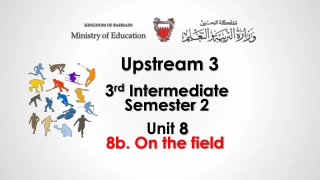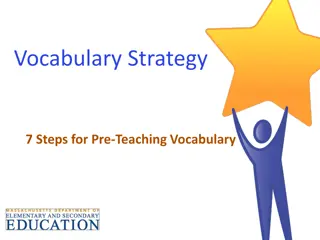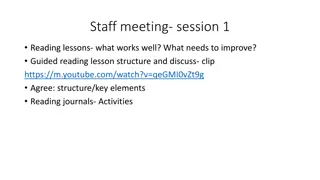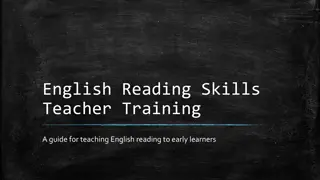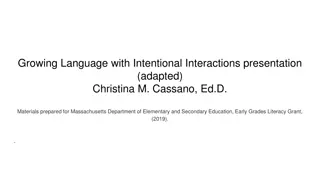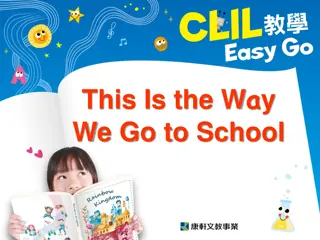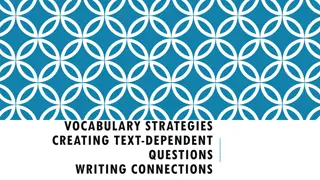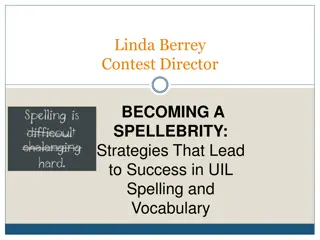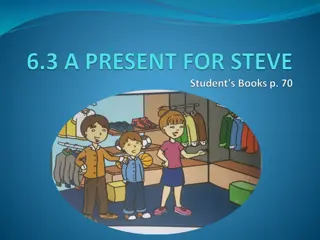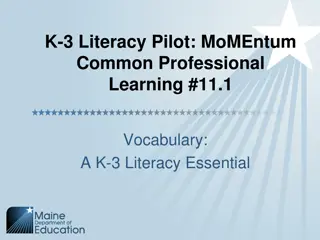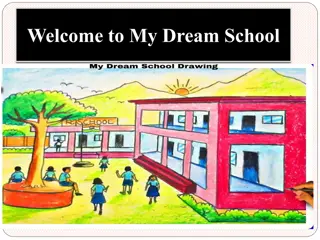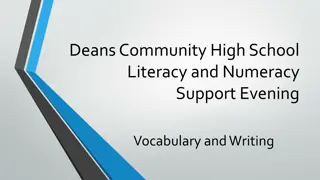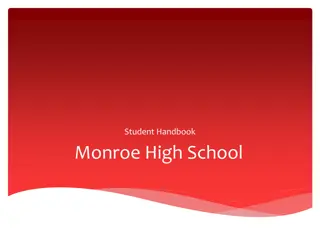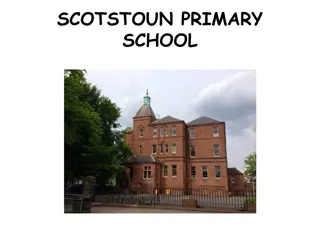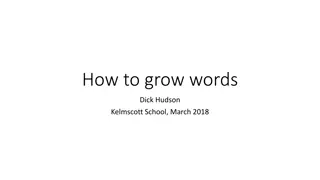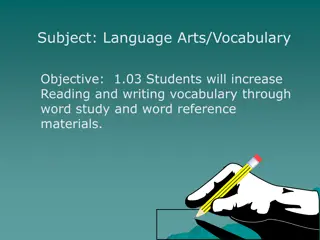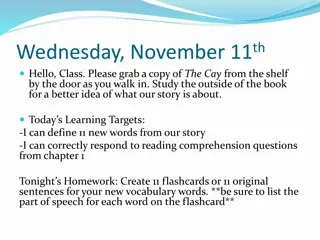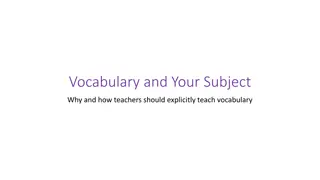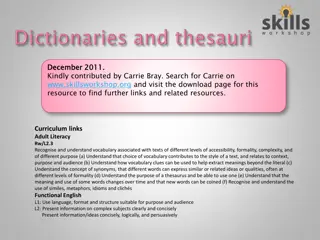Importance of Vocabulary Development in School
Vocabulary development in children is crucial as it forms the basis for language skills, impacting processing, attention, learning, and social interaction. Poor vocabulary at young ages can lead to academic challenges, social difficulties, and even mental health issues in adulthood. The cycle of vocabulary growth affects reading habits, underscoring the need for focused support in this area. Various facts and figures highlight the long-term consequences of inadequate vocabulary on individuals' lives.
Download Presentation

Please find below an Image/Link to download the presentation.
The content on the website is provided AS IS for your information and personal use only. It may not be sold, licensed, or shared on other websites without obtaining consent from the author. Download presentation by click this link. If you encounter any issues during the download, it is possible that the publisher has removed the file from their server.
E N D
Presentation Transcript
Supporting Vocabulary Development in School
Why is Vocabulary so important? ANd9GcTO6XP0NndqynFzT6U-zTOrCPqTk4lz3bhj6LDxh7xjLoNXZQPhPCbJA28
Why Vocabulary Matters Vocabulary, the words a child understands, is the foundation of all other language skills. A child must reach a certain level of vocabulary development before they can begin joining words to express ideas, answer questions and state preferences. This has an impact on processing, attention and ability to follow instructions and learn. It also has an affect on their interaction with peers and adults.
Facts and Figures Life stage Poor vocabulary age 2 Outcomes Do less well academically and socially at 6 Reading less well at 7 Twice as likely to be unemployed in their 30s One and a half times more likely to have mental health issues Less likely to enjoy school at age 7 6x less likely to do well in English 10x less likely to do well in maths at age 11 Poor vocabulary age 5 Poor communication & language age 5 Source: Talking About A Generation (2017)
Facts and Figures Children with poor vocabulary are twice as likely to be unemployed in adulthood (Bercow Review 2018) 60% of young offenders have low language skills.
A vicious cycle Child has a high vocabulary Reads more because it s less challenging Further increase vocabulary Child has a low vocabulary Reads less because it s challenging Vocabulary grows slowly
The Communication Trust. http://www.thecommunicationtrust.org.uk/media/43 8907/tct_commthecurric_poster_3.pdf
STAR Approach Select ANd9GcR8XqmOyKj6WETD1Ko-YYCQnuTkQO3EtbZ5dyIRcPoFs9pQyLnqhoIjiVc Teach Activate/Activity Review Modified from Blachowicz and Fisher ( 2010 )
STAR-Select - Primary Anchor words (Most children know) (not too easy or too hard but just right.) Goldilocks words Step on words (topic specific) Words describing a basic concept in greater detail e.g. agony, tedious, hideous. (very useful for literate language. Everyday basic familiar words, used frequently (e.g. clock, happy, school) Subject-specific words (e.g. cytoplasm, apparatus, ecosphere, pivot) Process vocabulary used across several or all subjects (e.g. Participation, design, construct, defend, estimate, describe) High frequency No need to teach High frequency Rarely taught Low frequency Often taught Beck, Mckeown and Kucan (2002)
ANd9GcR8XqmOyKj6WETD1Ko-YYCQnuTkQO3EtbZ5dyIRcPoFs9pQyLnqhoIjiVcANd9GcR8XqmOyKj6WETD1Ko-YYCQnuTkQO3EtbZ5dyIRcPoFs9pQyLnqhoIjiVc STAR Select Put the following into 3 categories: anchor, goldilocks, step on words. country, continent, route, monsoon, river, distance, weather, home, cash crop, family, economic activity, village, key, landscape, climate, crops, remote, symbol, hill, houses, occupation, nucleated, market town, settlement, city, road, linear, trade, airport, agriculture
ANd9GcR8XqmOyKj6WETD1Ko-YYCQnuTkQO3EtbZ5dyIRcPoFs9pQyLnqhoIjiVcANd9GcR8XqmOyKj6WETD1Ko-YYCQnuTkQO3EtbZ5dyIRcPoFs9pQyLnqhoIjiVc A Village in India: Year 4 Anchor words Goldilocks words Step on words Country, village, city, hill, river, weather, road, airport, home, houses, family Continent, landscape, climate, route, distance, agriculture, crops, remote, symbol, key, occupation, trade, market town Settlement, monsoon, nucleated, linear, cash crop, economic activity
ANd9GcR8XqmOyKj6WETD1Ko-YYCQnuTkQO3EtbZ5dyIRcPoFs9pQyLnqhoIjiVcANd9GcR8XqmOyKj6WETD1Ko-YYCQnuTkQO3EtbZ5dyIRcPoFs9pQyLnqhoIjiVc STAR Teach STAR topic teaching sequence Symbol/Picture/Photograph Phonology (sound) clap, rhyme, initial sound, say to partner Semantics (meaning) Put it in a sentence Action Song Working word wall Word Pot
Sample of vocabulary learning sheet What does it do? What do you do with it? What does it look like? How many syllables? Word Where do you find it? What does it start with? What group does it belong to? What does it end with? What does it rhyme with?
Sample of vocabulary learning sheet Can you put it in a sentence? The gang made their escape How many syllables? 2 ESCAPE What does it mean? To break free or break out. What does it start with? e What group does it belong to? Noun or verb What does it end with? e What does it rhyme with? Landscape, seascape, reshape
ANd9GcR8XqmOyKj6WETD1Ko-YYCQnuTkQO3EtbZ5dyIRcPoFs9pQyLnqhoIjiVcANd9GcR8XqmOyKj6WETD1Ko-YYCQnuTkQO3EtbZ5dyIRcPoFs9pQyLnqhoIjiVc STAR Activate Might look a lot like your normal lesson but: Adults use the word many times Prompt children to use the word: For information to pass from our short to long-term memory it must be used rather than simply heard or seen. Link vocabulary to activity
ANd9GcR8XqmOyKj6WETD1Ko-YYCQnuTkQO3EtbZ5dyIRcPoFs9pQyLnqhoIjiVcANd9GcR8XqmOyKj6WETD1Ko-YYCQnuTkQO3EtbZ5dyIRcPoFs9pQyLnqhoIjiVc STAR Review Reviewing words helps words fix into the child's long term memory. This needs to be done at the end of the lesson and also at various times such as: following week end of the half term next term Ways of reviewing: Word Pot, Discussion, Stickers home, Games, Fortune Teller, Pass the Object
STAR topic summary Select- pick a goldilocks word. Teach- the word to the whole class-word wizard sheet. Activate- usethe word in the lesson linked to what the children are doing many times and encourage them to use it too. Review- Word pot, discussion, stickers home (fridge words), games
ANd9GcRosF9KFiiiFTM_eX3w-fMI9IJUZaJ2eQibjbwVe3lIreEnX8OMHlVxHcytANd9GcRosF9KFiiiFTM_eX3w-fMI9IJUZaJ2eQibjbwVe3lIreEnX8OMHlVxHcyt How can we make our classrooms word friendly and how do we teach words? ANd9GcTO6XP0NndqynFzT6U-zTOrCPqTk4lz3bhj6LDxh7xjLoNXZQPhPCbJA28
Make your classroom Vocabulary Friendly Working Word Wall Give a clue Say it in a sentence Word Pot Act it out Word Learning Checklist
Whole class approaches Plan for the introduction of new vocabulary in short term plans Have a word of the day use it in context as many times as possible Build up word families-Create a working word wall. Pre-teach vocabulary before introducing it in a story or topic Support their auditory memory and retention with visuals.
Vocabulary in independent tasks Vocabulary Self-rating Scale Word Games e.g. Pass the bomb Use of Vocabulary Learning Checklists Vocabulary Notebook Taking responsibility for new words e.g. through use of dictionary / thesaurus Fridge Words Reading Book Challenge ANd9GcSbjxroCAhdpHrVqLKEN0iQ8yb5dS-subcDnFjTA4djZhToM9Pv5SHINvc5
Action Plan Lots of information given but how can you go away from today and use it? Make yourself an action plan that could be used from tomorrow . Think of examples of step-on words for your current topic that can be introduced with a word map and put in a word pot! * Please activate your plan prior to referral to Speech & Language Therapy


